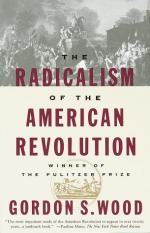
|
| Name: _________________________ | Period: ___________________ |
This test consists of 5 multiple choice questions, 5 short answer questions, and 10 short essay questions.
Multiple Choice Questions
1. What did the revolutionaries mean when they said they supported equality?
(a) They supported equality of opportunity.
(b) They supported equal education.
(c) They supported equal income.
(d) They supported equal distribution of wealth.
2. Where was the first county fair held?
(a) Escambia County, Rhode Island.
(b) Berkshire County, Massachusetts.
(c) Green County, Connecticut.
(d) Albany County, New York.
3. Who strove to undermine the gentry's distinctiveness and privileges by emphasizing their similarity to common people?
(a) Abraham Bishop.
(b) William Drayton.
(c) Matthew Lyon.
(d) George Warner.
4. In the late 18th century, what replaced whipping and execution as penal codes?
(a) Restitution.
(b) Rehabilitation.
(c) Deportation.
(d) Imprisonment.
5. Who became the richest man in Gloucester, R.I., just a few years before the revolution?
(a) Thomas Hutchinson.
(b) David Ramsey.
(c) Moses Cooper.
(d) Josiah Quincy.
Short Answer Questions
1. What most alarmed the American colonial gentry of the 1760s and 1770s?
2. When was the Virgina constitution written?
3. Who said, "Idolatry to Monarchs and servility of Aristocratic Pride was never so totally eradicated from so many in so short a time"?
4. In 1800, what percent of the American labor force was in farming?
5. In the late 1760s, who dismissed people's right to participate in government if they didn't have a liberal arts education?
Short Essay Questions
1. What influence did George Washington exert at the Philadelphia Convention of 1787?
2. What was the reason for the American 'economic miracle' of the 19th century?
3. By the end of the 18th century, what was the source of the American aristocracy's downfall?
4. What did individual independence mean to revolutionaries?
5. Why was it impossible for Christianity to be the one means of unifying America at the end of the 18th and beginning of the 19th centuries?
6. What was hoped to replace fear and favor in enlightened colonial American society? How would the replacement be manifested?
7. What does this quote mean? "Idolatry to Monarchs, and servility to Aristocratic Pride was never so totally eradicated from so many in so short a time."
8. How did the opinion of a traditional gentleman's assumption of leisure change towards the end of the 18th century?
9. Towards the end of the 18th century and beginning of the 19th century, what was the result of Americans believing that every man was his own moral agent who was his own master in all respects and could dispose himself as he wished?
10. According to John Toland, what is the difference between a man who is free and one who is dependent?
|
This section contains 1,006 words (approx. 4 pages at 300 words per page) |

|




